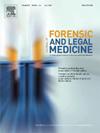Ethyl alcohol consumption characteristics of deceased individuals in Lithuania
IF 1.2
4区 医学
Q3 MEDICINE, LEGAL
引用次数: 0
Abstract
The number of alcohol-related deaths in Lithuania has fallen by almost one-third in the last decade; however, the number of deaths has been on the rise since 2019. Data on the postmortem investigation of victims between 2018 and 2022 were obtained from the Lithuanian State Forensic Medicine Service database. This study analyzed data from 1200 autopsies. The deceased victims were categorized based on their cause of death and blood alcohol concentration (sober, legally intoxicated, mild, medium, or heavy). The causes of death were diseases (54.17 %, n = 650), suicides (12.08 %, n = 145), homicides (2.5 %, n = 30), and accidents (31.25 %, n = 375). Toxicological tests for alcohol were performed in all cases. Alcohol levels in the blood and urine were measured using gas chromatography. A significant correlation was observed between blood alcohol concentration and age (r = −0.13, p = 0.007). A statistically significant difference was observed in the proportions of men and women who were intoxicated. Among the causes of death, the group of individuals who died because of accidents exhibited the highest average blood alcohol concentration. Alcohol intoxication is undoubtedly a contributing factor to fatalities resulting from accidents and homicides. These findings assist in determining the intoxication level of victims and in assessing any potential links that may contribute to or predispose victims to lethal outcomes in cases of disease, suicide, homicide, or accident.
立陶宛死者的乙醇消费特点
在过去十年中,立陶宛与酒精有关的死亡人数下降了近三分之一;然而,自2019年以来,死亡人数一直呈上升趋势。有关 2018 年至 2022 年期间受害者尸检调查的数据来自立陶宛国家法医服务数据库。本研究分析了 1200 例尸检数据。死者根据死因和血液中酒精浓度(清醒、合法醉酒、轻度、中度或重度)进行了分类。死亡原因包括疾病(54.17%,n = 650)、自杀(12.08%,n = 145)、他杀(2.5%,n = 30)和意外(31.25%,n = 375)。对所有病例都进行了酒精毒理学检测。血液和尿液中的酒精含量是通过气相色谱法测定的。血液中的酒精浓度与年龄之间存在明显的相关性(r = -0.13,p = 0.007)。从统计学角度看,醉酒的男女比例存在明显差异。在死亡原因中,死于意外事故的人群平均血液酒精浓度最高。酒精中毒无疑是导致事故和凶杀死亡的一个因素。这些研究结果有助于确定受害者的醉酒程度,并评估在疾病、自杀、凶杀或意外事故中可能导致或易导致受害者死亡结果的任何潜在联系。
本文章由计算机程序翻译,如有差异,请以英文原文为准。
求助全文
约1分钟内获得全文
求助全文
来源期刊

Journal of forensic and legal medicine
MEDICINE, LEGAL-
CiteScore
2.70
自引率
6.70%
发文量
106
审稿时长
57 days
期刊介绍:
The Journal of Forensic and Legal Medicine publishes topical articles on aspects of forensic and legal medicine. Specifically the Journal supports research that explores the medical principles of care and forensic assessment of individuals, whether adult or child, in contact with the judicial system. It is a fully peer-review hybrid journal with a broad international perspective.
The Journal accepts submissions of original research, review articles, and pertinent case studies, editorials, and commentaries in relevant areas of Forensic and Legal Medicine, Context of Practice, and Education and Training.
The Journal adheres to strict publication ethical guidelines, and actively supports a culture of inclusive and representative publication.
 求助内容:
求助内容: 应助结果提醒方式:
应助结果提醒方式:


